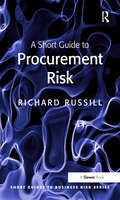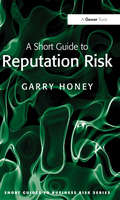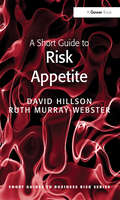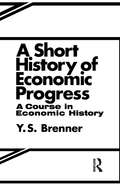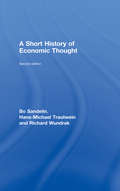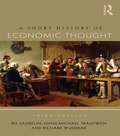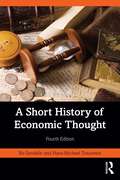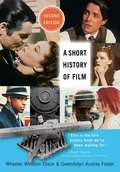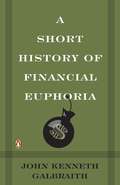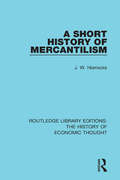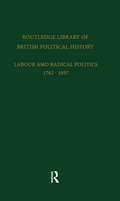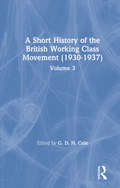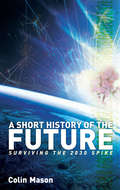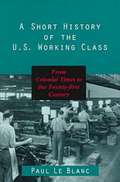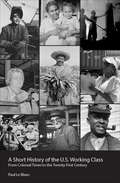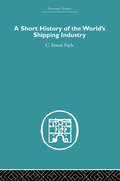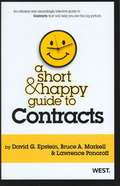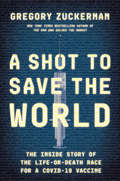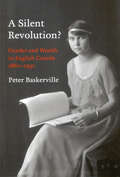- Table View
- List View
A Short Guide to Procurement Risk (Short Guides to Business Risk)
by Richard RussillIncreasingly, top executives view supply markets as sources of competitive advantage and as means of achieving strategic objectives. Procurement is the management activity that makes this happen, and this process depends on a superior risk management capability if it is be effective. Yet, despite its importance, Procurement Risk Management is surprisingly under-developed. Recent Global Risk surveys have pinpointed Supply Chain Vulnerability as one of the four key global risks for the next decade. What is less well known is that this is only half of the story ... risk exposures also exist inside the company and can be just as damaging. No company is an island; it needs suppliers as well as customers. Conventional wisdom puts great emphasis on managing certain aspects of business such as customers; operations; strategy and finances. Typically, however, much less regard is paid to external suppliers and the risks present in dealing with them. As a minimum, suppliers are the sources of materials, services and expert attention which enable the company to feed its business model. When done well, a risk-aware procurement process provides the bonus of competitive advantage, with the ability to capitalise, on the occurrence of unexpected events. This short guide explains just how to do it. Each chapter explores the topic in hand, outlines the risks and the remedies available and offers guidance on the principles and risk prevention.
A Short Guide to Reputation Risk (Short Guides to Business Risk)
by Garry HoneyDoes your organization have a good or bad reputation, and who takes responsibility for it? Whether viewed as an intangible asset or potential liability, damage to reputation can be costly. In the private sector loss of investor confidence can dent corporate value; in the public sector loss of public trust can lead to political change. How can anyone protect reputation from damage?
A Short Guide to Risk Appetite (Short Guides to Business Risk)
by David Hillson Ruth Murray-WebsterHow much risk should we take? A Short Guide to Risk Appetite sets out to help all those who need to decide how much risk can be taken in a particular risky and important situation. David Hillson and Ruth Murray-Webster introduce the RARA Model to explain the complementary and central roles of Risk Appetite and Risk Attitude, and along the way they show how other risk-related concepts fit in. Risk thresholds are the external expression of inherent risk appetite, and the challenge is how to set the right thresholds. By progressively deconstructing the RARA Model, the authors show that the essential control step is our ability to choose an appropriate risk attitude. The book contains practical guidance to setting risk thresholds that take proper account of the influences of organisational risk culture and the individual risk preferences of key stakeholders. Alongside this, individuals and organisations need to choose the risk attitude that will optimise their chances of achieving the desired objectives.
A Short History of Economic Progress: A Course In Economic History
by Y.S. BrennorY. S. Brenner is an economist whose main concern is with development, and this attitude is reflected in his approach to economic history.He begins this seminal study in the era of the Reformation in Europe, and bases it on the hypothesis that once started, economic progress will spread over ever-increasing parts of the earth wherever and whenever conditions become suitable. From this point of view, he examines the nature of the impediments which prevent the more rapid and general progress of mankind towards greater material affluence, while at the same time considering the positive growth promoting factors in the various economies. Thus, he provides an analysis of economic progress in the developed countries showing which natural, social, political and cultural forces promoted such progress and which delayed or hindered it. He attempts to explain why European nations took several decades to emulate the achievements of Britain and why nations in other parts of the world, such as Japan and Russia, were unable for a considerable time to match the advances made in parts of Western Europe and the United States. Finally, he attempts to explain why the developing countries are still finding it so difficult to catch up with the economic progress of the more advanced nations.Y. S. Brenner was Head of the Department of Economics at Cape Coast University in Ghana. The book arose from a series of lectures on economic development he delivered there during the years 1966-1967. This book was first published in 1969.
A Short History of Economic Thought
by Bo Sandelin Hans-Michael Trautwein Richard WundrakThis book provides an elementary introduction to the history of economic thought and has been considerably overhauled and updated since the appearance of the first edition in 2002. A chapter is devoted to each of the major developments in the history of the discipline, with a brand new introduction setting the scene.This short history of economic thinking covers large ground by outlining the main schools of thought and paradigm shifts in the field. Greater coverage is allowed to the major Anglo-American trends while retaining the innovative coverage of mainland European thinking so characteristic of the original. In the final chapter, the authors draw together some of the key strands and comment on some major works and textbooks in the history of economic ideas. The book concludes by reflecting on the changes in economic thinking within the general context of the philosophy of science
A Short History of Economic Thought
by Bo Sandelin Hans-Michael Trautwein Richard WundrakThis book, now in its third edition, provides an elementary introduction to the history of economic thought. A chapter is devoted to each of the major developments in the history of the discipline, before a concluding chapter in which the authors draw together some of the key strands and comment on some major works and textbooks in the history of economic ideas. They also reflect on the changes in economic thinking within the general context of the philosophy of science. This new edition continues to offer the clear and concise coverage of the main schools of thought and paradigm shifts in the field that has become the volume’s trademark. The book has been thoroughly updated throughout in order to reflect changes in the landscape of the field. Details on key thinkers, and aspects of the story such as the evolution of scholarship on growth and development, have been added or expanded, whilst not compromising on the book’s concise approach. Key updates include: Biographical- and bibliographical information is brought up to date throughout the text North American economists John Kenneth Galbraith and Kenneth Ewart Boulding make their first appearance in this edition Information on developments in institutional economics, addressing in particular the works of 2009 Nobel prize winner Elinor Ostrom). This book has become well known for its innovative coverage of the economic thinking of mainland Europe, whilst also addressing Anglo-American trends. It provides a short and highly readable overview of the evolution of economic thought, usable in courses where the history of economic thought constitutes only a small part or required background reading. It continues to be an extremely useful, much needed text for all introductory economics courses in the field.
A Short History of Economic Thought
by Bo Sandelin Hans-Michael TrautweinNow in its fourth edition, A Short History of Economic Thought provides an elementary overview of the history of economic thought. This new edition continues to offer its trademark of clear and concise coverage of the main schools of thought and paradigm shifts in the field of mainland Europe, as well as addressing Anglo-American trends. The book has been thoroughly updated throughout in order to reflect changes in the landscape of the field. Details on key thinkers, on early developments outside the Western world, and on the recent evolution of scholarship in quantitative and non-orthodox turns have been added or expanded, while not compromising on the book’s concise approach. A chapter is devoted to each of the major developments in the history of the discipline, concluding with a chapter in which the authors draw together some of the key strands and comment on major works and textbooks in the history of economic ideas. They also reflect on the changes in economic thinking within the general context of the philosophy of science. This text is ideal for courses where the history of economic thought constitutes only a small part or required background reading. It also continues to be an extremely useful, much-needed text for all introductory economics courses in the field.
A Short History of Film
by Wheeler Dixon Gwendolyn FosterA Short History of Film, Second Edition, provides a concise and accurate overview of the history of world cinema, detailing the major movements, directors, studios, and genres from 1896 through 2012. The new edition is unmatched in its panoramic view, conveying a sense of cinema's sweep in the twentieth and early twenty-first centuries as it is practiced in the United States and around the world.
A Short History of Financial Euphoria
by John Kenneth GalbraithIn this book, its brevity compelling attention, the eminent economist chronicles the histories of several speculative periods of the last three centuries, discussing their sad aftermaths and analyzing the peculiar pitfalls of get-rich-quick schemes.
A Short History of Financial Euphoria
by John Kenneth GalbraithThe world-renowned economist offers "dourly irreverent analyses of financial debacle from the tulip craze of the seventeenth century to the recent plague of junk bonds. "-The Atlantic. .
A Short History of Financial Euphoria
by John Kenneth GalbraithThe world-renowned economist offers "dourly irreverent analyses of financial debacle from the tulip craze of the seventeenth century to the recent plague of junk bonds."-The Atlantic.
A Short History of Mercantilism (Routledge Library Editions: The History of Economic Thought)
by J. W. HorrocksThe purpose of this volume, first published in 1925, is to provide the historical account of the regime whereby the State, in different countries, has sought to control economic life in the interests of political and national strength and independence. This study explores the history of the Mercantile System, or Mercantilism, in different nations. It also examines the methods adopted by the State for the promotion and regulation of agriculture, industry and commerce. This title will be of interest to students of economics.
A Short History of the British Working Class Movement (1937): Volume 2
by G. D. ColeThis is volume 2 of the set A Short History of the British Working Class Movement (1937). The volumes reprinted here provide a general narrative of the history of the working class movement in all its main aspects - Trade Unions, Socialism and Co-operatives. The historical focus is upon the latter part of the eighteenth century, set against a background of economic and social history.
A Short History of the British Working Class Movement (1937): Volume 3
by G. D. ColeThis is volume 3 of the set A Short History of the British Working Class Movement (1937). The volumes reprinted here provide a general narrative of the history of the working class movement in all its main aspects - Trade Unions, Socialism and Co-operatives. The historical focus is upon the latter part of the eighteenth century, set against a background of economic and social history.
A Short History of the Future: Surviving the 2030 Spike
by Colin MasonHas the future a future? Are we bringing history to an end? Observing any one of several individual but critical trends suggests that, without rapid and positive action, history may have only a very short way to run. Whether it is the growth of world population, of greenhouse gas concentrations and the accelerating rate of climate change, the running down of oil and natural gas reserves, growing shortages of fresh water for agriculture, industry and domestic use, or the increasing difficulty in controlling epidemic diseases ? we are facing a mounting global crisis that will peak in less than a generation, around the year 2030. Taken together, these trends point to a potentially apocalyptic period, if not for the planet itself then certainly for human societies and for humankind. In this compelling book, and update to The 2030 Spike, Colin Mason explains in clear and irrefutable terms what is going on ? largely below the surface of our daily or weekly news bulletins. The picture he paints is stark, and yet it is not bleak. Being forewarned, we are forearmed, and he draws on his own extensive political experience to describe how much we can do as individuals, and above all collectively, not merely to avert crisis but to engineer thoroughgoing change that can usher in genuinely sustainable and valuable alternatives to the way we live now.
A Short History of the U.S. Working Class: From Colonial Times to the Twenty-First Century
by Paul Le BlancThe book covers the vast contrast of working class that have been striving to build the country over the years - from rich elite to "middle income" and those still living below poverty line.
A Short History of the U.S. Working Class: From Colonial Times to the Twenty-First Century (Revolutionary Studies)
by Paul Le Blanc&“His aim is to make the history of labor in the U.S. more accessible to students and the general reader. He succeeds&” (Booklist). In a blend of economic, social, and political history, Paul Le Blanc shows how important labor issues have been, and continue to be, in the forging of our nation. Within a broad analytical framework, he highlights issues of class, gender, race, and ethnicity, and includes the views of key figures of United States labor. The result is a thought-provoking look at centuries of American history from a perspective that is too often ignored or forgotten. &“An excellent overview, enhanced by a valuable glossary.&” —Elaine Bernard, director of the Harvard Trade Union Program
A Short History of the World's Shipping Industry
by C. Ernest FayleFirst Published in 2005. Routledge is an imprint of Taylor & Francis, an informa company.
A Short Note on Fiduciary Duties
by Lena G. Goldberg Rebecca M. Henderson Amy W. SchulmanIndustry and Background Note
A Short and Happy Guide to Contracts
by Bruce A. Markell David G. Epstein Lawrence PonoroffThis efficient and exceedingly effective guide to Contracts will help you see the big picture. The authors focus on making the key concepts of contract law, and the relationship among those concepts, easier to understand and retain. The authors have also infused the book with humor, believing there is nothing inconsistent between a rigorous academic experience and having a little fun. Each of the authors is nationally-renowned law teacher who has taught Contracts for decades. Based on that experience, in this book they have set forth understandable techniques for mastering the law governing each critical aspect of the contract relationship, including, contract formation (offer and acceptance), enforcement (consideration and defenses), interpretation, performance, breach, and remedies. Learn more about this series at ShortandHappyGuides. com.
A Shot to Save the World: The Inside Story of the Life-or-Death Race for a COVID-19 Vaccine
by Gregory Zuckerman"An inspiring and informative page-turner." –Walter IsaacsonLonglisted for the FT/McKinsey Business Book of the Year Award The authoritative account of the race to produce the vaccines that are saving us all, from the #1 New York Times bestselling author of The Man Who Solved the MarketFew were ready when a mysterious respiratory illness emerged in Wuhan, China in January 2020. Politicians, government officials, business leaders, and public-health professionals were unprepared for the most devastating pandemic in a century. Many of the world&’s biggest drug and vaccine makers were slow to react or couldn&’t muster an effective response. It was up to a small group of unlikely and untested scientists and executives to save civilization. A French businessman dismissed by many as a fabulist. A Turkish immigrant with little virus experience. A quirky Midwesterner obsessed with insect cells. A Boston scientist employing questionable techniques. A British scientist despised by his peers. Far from the limelight, each had spent years developing innovative vaccine approaches. Their work was met with skepticism and scorn. By 2020, these individuals had little proof of progress. Yet they and their colleagues wanted to be the ones to stop the virus holding the world hostage. They scrambled to turn their life&’s work into life-saving vaccines in a matter of months, each gunning to make the big breakthrough—and to beat each other for the glory that a vaccine guaranteed. A #1 New York Times bestselling author and award-winning Wall Street Journal investigative journalist lauded for his &“bravura storytelling&” (Gary Shteyngart) and &“first-rate&” reporting (The New York Times), Zuckerman takes us inside the top-secret laboratories, corporate clashes, and high-stakes government negotiations that led to effective shots. Deeply reported and endlessly gripping, this is a dazzling, blow-by-blow chronicle of the most consequential scientific breakthrough of our time. It&’s a story of courage, genius, and heroism. It&’s also a tale of heated rivalries, unbridled ambitions, crippling insecurities, and unexpected drama. A Shot to Save the World is the story of how science saved the world.
A Silent Revolution?
by Peter BaskervillePeter Baskerville situates women in their immediate gendered and familial environments as well as within broader legal, financial, spatial, temporal, and historiographical contexts. He analyses women's probates, wills, land ownership, holdings of real and chattel mortgages, investment in stocks and bonds, and self employment, revealing that women controlled wealth to an extent similar to that of most men and invested and managed wealth in increasingly similar, and in some cases more aggressive, ways.
A Simple Free Cash Flow Valuation Model
by William A. SahlmanExplores some of the issues involved in valuing cash flow streams. A simple model is presented that reveals the effect on value of changing assumptions about the appropriate discount rate, the level of profitability, the growth rate of sales, the asset intensity ratio, and the leverage ratio. Helps students address some of the following issues: 1) What is the definition of cash flow? 2) What effects do changes in the discount rate have on valuation? 3) How sensitive is value to changes in assumptions about the underlying characteristics of the cash flow stream? 4) How does growth affect value? 5) How does the use of leverage affect value? 6) What are price-to-earnings ratios? and 7) What factors affect price-to-earnings ratios?
A Simple Graphical Framework for Use in The Role of Government in Market Economies (RoGME)
by Matthew C. WeinzierlIndustry and Background Note
A Simple Problem: Real World Strategies for Managing First Impressions, Scoping an Engagement, and Performing Situation Analysis with Limited Information
by Jay Barney Patricia Gorman Clifford"What I Didn't Learn in Business School" follows new consultant Justin Campbell as he joins an elite team hired by a chemical firm to assess the potential of a newly developed technology. In this fictional account, authors Jay Barney and Trish Gorman Clifford take you into the mind of a new consultant as he encounters the challenges of applying business school lessons in the real-world-the way a traditional book on business strategy never could. This chapter introduces Justin on his first day as he meets his new colleagues, prepares for his first client meetings, and confronts the complexities of organizational politics as he begins to gather information on the client's business. This chapter was originally published as Chapter 1 of "What I Didn't Learn in Business School: How Strategy Works in the Real World."
